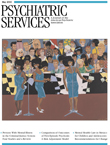A Case of Neutralized Findings?
To the Editor: A funny thing happens on the way to determining whether an element of coercion is effective in some cases of outpatient treatment. No one wants to find out. The study by Phelan and colleagues (
1 ) in the February issue is another example. It is beyond me why these excellent researchers would have used their time and New York State's scarce mental health resources to do this work.
The study is particularly seductive because its elements appear to be the concrete in the foundation of evidence-based findings. The study compared outcomes of an experimental group treated under New York State's assisted outpatient treatment statute (Kendra's Law) and a control group discharged from a psychiatric hospital and attending the same outpatient facilities as the patients in the experimental group. The authors state that because assisted outpatient treatment includes not only coerced treatment but also enhanced services, "We cannot conclude which of these elements of the package deal contributed most to the generally positive outcomes for participants." However, the researchers knew this before they began the study. The study as designed had no possibility of evaluating coercion per se. The article's last sentence—"We therefore caution against using our results to justify an expansion of coercion in psychiatric treatment"—is disingenuous at best.
More puzzling is the last sentence of the abstract, which goes even further: "As such, the results do not support the expansion of coercion in psychiatric treatment." But the results don't refute the expansion of coercion either, which the authors could just as easily have stated in their concluding sentence.
Furthermore, the findings actually do, in some respects, support the use of coercion. The authors found that the patients who received assisted outpatient treatment were significantly less likely to engage in serious violent behavior, had a lower risk of suicide, and had better illness-related social functioning. There was also a trend for patients in this group to have a better quality of life. These findings could result from the coercion plus ancillary services. However, as a take-home message the authors offer their additional finding that the experimental group reported marginally less (p<.10) coercion and stigma than the control group. Thus some degree of coercion led to their experiencing less coercion and stigma. In and of itself, that is a profound argument for the benefits of the coercive component in assisted outpatient treatment.
Currently, a debate is going on in New York State about whether to make Kendra's Law permanent. Despite the authors' gyrations to neutralize their own findings, their study provides data that supports Kendra's Law, and it provides absolutely no evidence that refutes the concept that a "tincture of coercion" (
2 ), as used in assisted outpatient treatment, is an integral element in the treatment of a subset of patients in community-based psychiatric care.

